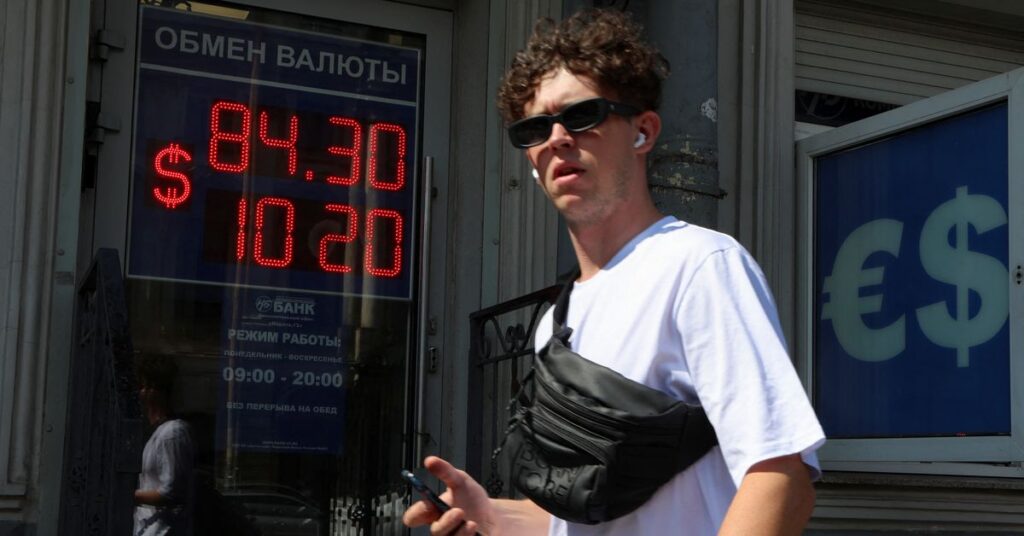NEW YORK/LONDON, June 25 (Reuters) – Investors were watching for ripple effects from the aborted mutiny in Russia, with some expecting a move into safe havens such as U.S. government bonds and the dollar.
Heavily armed Russian mercenaries withdrew from the southern Russian city of Rostov on Saturday under a deal that halted their rapid advance on Moscow but left unanswered questions about President Vladimir Putin’s grip on power.
Early trade in Asia saw oil firmer on the instability in Russia, but currencies and stock and bond futures steady.
“(The mutiny) started and stopped when markets were closed, so there’s been no instant reaction,” said Commonwealth Bank of Australia strategist Joe Capurso in Sydney.
“But it’s probably not resolved,” he said. “If there’s new developments or deterioration…it’d be good for the dollar and the yen.”
S&P 500 futures rose 0.2%, suggesting markets were mostly taking the developments in their stride for now.
Financial markets have often been volatile since Russia invaded Ukraine in February 2022, which caused ruptures in markets and through global finance as banks and investors rushed to unwind exposure.
After Saturday’s events, some investors said they were focused on the potential impact to safe-haven assets such as U.S. Treasuries and on commodities prices, given Russia is a major energy and grains supplier.
“If there remains uncertainty about leadership in Russia, investors may flock to safe havens,” said Gennadiy Goldberg, head of U.S. rates strategy at TD Securities in New York.
The action sparked attention globally and revived an old fear in Washington about what happens to Russia’s nuclear stockpile in the event of domestic upheaval.
“Markets typically do not respond well to events that are unfolding and are uncertain,” particularly relating to Putin and Russia, said Quincy Krosby, chief global strategist at LPL Financial.
“If the uncertainty escalates, you’re going to see Treasuries get a bid, gold will get a bid and the Japanese yen tends to gain in situations like this,” Krosby said, mentioning typical safe-haven assets that investors buy when risks rise.
While the de-escalation meant markets may now not react strongly, “Putin has clearly been weakened and there will be more developments,” said Alastair Winter, global investment strategist at Argyll Europe.
He saw the U.S. dollar finding “some support as the market returns to speculating over rate hikes and cuts and recession in different economies.”
Erik Myersson, chief emerging markets strategist at SEB, said that commodity markets, the main transmission channel for Russian political shocks to global markets, would be sensitive to developments ahead.
“We might see a move in Ukrainian assets and emerging market countries that are very dependant on Russian grain or could be providers of fossil fuels,” he added.
Stocks have been on a mostly upward path in recent months, which some said could make then more vulnerable to a selloff. Year to date the S&P 500 (.SPX) is up 13%, though it has lost steam in recent days, subdued by the prospect of rising interest rates.
Federal Reserve Chairman Jerome Powell gave testimony last week in which he signaled more interest rate hikes ahead.
Juan Perez, director of trading at Monex in Washington, expected currencies to react to the Russian turmoil.
“While the buck may improve off of the chaos… expect JPY (yen) to recover” as investors become more reticent to own assets in China, which has expressed support for Russia, he said.
In the second half of the year, “a flight toward Euro will materialize as forces retreat from Ukraine to protect their homeland from a coup,” Perez said.
Tina Fordham, founder of Fordham Global Foresight, said she expected little immediate impact.
“But there is more sensitivity and awareness by market participants that this increase in internal tension in Russia could translate into a markets event. There will be some cautious watching,” she said.
Reporting by Lananh Nguyen, Sinead Cruise, Megan Davies and Karin Strohecker. Additional reporting by Tom Westbrook in Singapore; Writing by Megan Davies; Editing by David Gregorio, David Goodman and Mark Porter
: .


